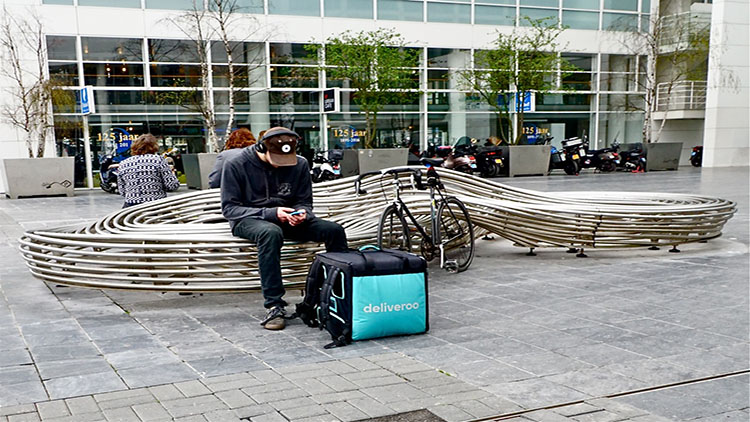
With the arrival of Covid-19, the survival of much of the food industry falls on the shoulders of couriers out taking huge risks every day to get Britain fed, says Harry Thompson
The street is quiet, at least a lot quieter than usual. As the sun begins to go down, the only sounds to be heard are sirens and the rattle of empty trains, seemingly noisier now they’re not weighed down by passengers. Above, not a plane in the sky.
Out of the blanket of quiet that has fallen on London comes a whiney droning sound.
For the delivery rider, it’s business as usual, their hectic battles through rush hour traffic may be easier now, but the pressures of time and income haven’t gone away. As we sit at home, stewing, pacing, pledging to learn a new skill, they brave contagion for the sake of around £3 per delivery.
Across the nation, a near obsessive concern of spreading germs now reigns supreme (and rightly so) – the result of this is a general distrust of all those not residing within our own four walls. This is no different for the delivery driver who knocks on countless doors, collects food from densely packed kitchens and generally exists in the outside world that is already, for most of us, a distant memory.
There are, no doubt, benefits to this. The quiet roads, empty parks and deserted restaurants may make the job slightly less frantic, but each night the courier goes home to their loved ones knowing they have come into more contact with people than most of us will in a month. While the NHS is – finally – gaining traction in its efforts to be provided with half-sufficient protective equipment and supermarkets now limit the risk of infection by capping the number of people in stores, couriers must make do with “contactless deliveries” which still result in a number of contagion points, putting themselves and those they live with at risk.
If a courier becomes ill, unlike many of the other key worker roles, there’s no financial safety net. And, following Deliveroo’s commitment to help feed NHS workers and the housebound for free, the high levels of exposure show no sign of subsiding.
As if this wasn’t enough, delivery riders are in many cases the only lifeline for swathes of businesses, who without the means of distribution would have already succumbed to the loss of custom. They are the final frontier, risking a lot, but helping even more.
This week, ELL has tried shine a light on the realities of poor hygiene in a small but significant proportion of our restaurant industry. But now Covid-19 has the entire industry in a stranglehold, and it falls on the shoulders of a network of helmeted, anonymous riders on the breadline to keep it afloat. Spare them a thought.
This is day three of our series on food hygiene. Check out the rest of the series here #foodforthought




